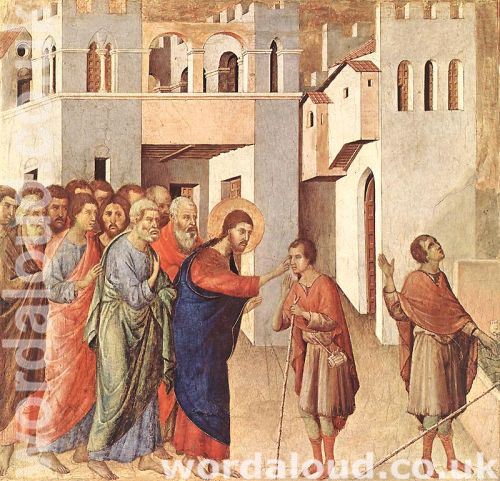Christian Art | Prayer With Jesus | Pray The Psalms
Office Of Readings | Week 10, Friday, Ordinary Time | A Reading From The Discourse Of Saint Ambrose On The Psalms | The Delightful Book Of The Psalms
‘The conquest of Jericho.’
The Psalter’s Unique Grace
Saint Ambrose opens with a sweeping affirmation: though all of Scripture breathes God’s grace, the Book of Psalms possesses a distinctive attractiveness. This is not mere literary charm; it is the fruit of divine inspiration that speaks directly to the human heart. The Psalms do not merely record history or doctrine—they pray, praise, plead, and weep with the reader. They give voice to every spiritual state, forming what Ambrose calls a gymnasium for the soul, a place where each believer can exercise the virtues and train for heaven.
Psalms As History, Law, And Prophecy
Ambrose uses the figure of Moses to show how song naturally arises from divine encounter. Though Moses recorded Israel’s origins in prose, it was after the miracle of the Red Sea that he turned to poetry. This impulse reflects a deeper truth: when God acts beyond human comprehension, the soul soars in praise.
The Psalms echo that same movement. They contain historical summaries (e.g. Psalm 105–106), but also moral instruction (Psalm 1), the inner cries of repentance (Psalm 51), and the prophetic vision of Christ’s passion and glory (Psalm 22, Psalm 110). The law, fulfilled in charity, is not discarded but illuminated. The Psalms become a living law for those who love God, a compass of compassion and justice.
Psalms As Spiritual Gymnasium
Ambrose’s metaphor of a stadium for virtues is one of the most enduring images in this passage. Like a well-equipped gym, the Psalter trains the soul in every discipline: courage, patience, gratitude, humility, endurance. Those struggling with fear will find reassurance (e.g. Psalm 23), the penitent will discover words of sorrow and hope (Psalm 130), and the joyful will find anthems of praise (Psalm 150).
The Psalms do not demand a one-size-fits-all spirituality; rather, they meet each person in their concrete condition. For Ambrose, this universality is part of their divine design: all may ‘find the cure for their own individual failings’.
Jesus Christ In The Psalms
Here, Ambrose’s theology is both beautiful and bold. The Psalms do not only speak about Christ—they contain Christ. The Psalms are a window into the entire mystery of salvation:
- Incarnation: ‘I will place upon your throne one who is the fruit of your flesh’ (Psalm 132:11)
- Passion: ‘My God, my God, why have you forsaken me?’ (Psalm 22:1)
- Death: ‘You lay me in the dust of death’ (Psalm 22:15)
- Resurrection: ‘You will not let your holy one see corruption’ (Psalm 16:10)
- Ascension: ‘God goes up with shouts of joy’ (Psalm 47:5)
- Kingship: ‘Sit at my right hand’ (Psalm 110:1)
Ambrose emphasizes that what the prophets ‘hinted at in riddles’ is here revealed clearly. In this, he aligns with the early Christian understanding that the Psalter was not only prayer to God but revelation from God about His Son.
Psalms As The Songbook Of The Church
Ambrose’s pastoral sensitivity shines when he praises the Psalms as the prayer of the people. By his time (4th century), the Psalms had become the foundation of Christian worship, especially in the Divine Office. Monks to this day chant the entire Psalter weekly. Even lay Christians would have learned to pray the more familiar psalms by heart.
Ambrose sees this not as a burden, but as a divine gift: the Psalms shape affections, guide doctrine, and draw believers into the very rhythm of heaven. Whether whispered at night, recited at dawn, or sung in the Eucharist, they are the ‘language of the soul’.
Reflection | The Psalms As School Of Jesus Christ
Ambrose’s treatment of the Psalms is not an academic exercise—it is a call to transformation. To read the Psalms is to:
- Enter the story of Israel.
- Learn the virtues of the saints.
- Unite one’s voice with Christ the Head.
- Prepare for eternal praise in the Kingdom.
In the Psalms, Christ sings through David, prays through our mouths, and listens through the ears of the Father. Ambrose’s invitation is clear: do not merely read the Psalms—live them. Find in them a home for your wounds, a voice for your joys, and a path to the heart of God.

A Reading From The Discourse Of Saint Ambrose On The Psalms | The Delightful Book Of The Psalms
Though all Scripture is fragrant with God’s grace, the Book of Psalms has a special attractiveness.
Moses wrote the history of Israel’s forefathers in prose, but after leading the people through the Red Sea, a wonder that remained in their memory, he broke into a song of triumph in praise of God when he saw King Pharaoh drowned along with his forces.
His genius soared to a higher level, to match an accomplishment beyond his own powers.
Miriam too raised her timbrel and sang encouragement for the rest of the women, saying: Let us sing to the Lord, for he has triumphed gloriously; he has cast horse and rider into the sea.
In the Book of Psalms there is profit for all, with healing power for our salvation. There is instruction from history, teaching from the law, prediction from prophecy, chastisement from denunciation, persuasion from moral preaching. All who read it may find the cure for their own individual failings. All with eyes to see can discover in it a complete gymnasium for the soul, a stadium for all the virtues, equipped for every kind of exercise; it is for each to choose the kind he judges best to help him gain the prize.
If you wish to read and imitate the deeds of the past, you will find the whole history of the Israelites in a single psalm: in one short reading you can amass a treasure for the memory. If you want to study the power of the law, which is summed up in the bond of charity (Whoever loves his neighbor has fulfilled the law), you may read in the psalms of the great love with which one man faced serious dangers single-handedly in order to remove the shame of the whole people. You will find the glory of charity more than a match for the parade of power.
What am I to say of the grace of prophecy? We see that what others hinted at in riddles was promised openly and clearly to the psalmist alone: the Lord Jesus was to be born of his seed, according to the word of the Lord, I will place upon your throne one who is the fruit of your flesh.
In the psalms, then, not only is Jesus born for us, he also undergoes his saving passion in his body, he lies in death, he rises again, he ascends into heaven, he sits at the right hand of the Father. What no man would have dared to say was foretold by the psalmist alone, and afterward proclaimed by the Lord himself in the Gospel.

Prayer With Jesus
Lord God,
You have given us the Psalms as a wellspring of prayer,
a mirror for our souls,
and the voice of Your Son, our Redeemer.
May we read them not only with our minds but with our hearts.
Let them shape our desires, form our praises, and strengthen our hope,
until we join the heavenly choir that sings Your glory forever.
Through Christ our Lord. Amen.
Glossary Of Christian Terms
- Psalter: The Book of Psalms; also refers to the liturgical or devotional use of the Psalms in prayer.
- Miriam: Sister of Moses and Aaron; led the Israelite women in song after the crossing of the Red Sea (Exodus 15).
- Catechumen: One preparing for Christian baptism.
- Charity: The theological virtue of love, particularly love of God and neighbor.
- Economy (of salvation): The unfolding plan of God for humanity’s salvation through Christ.
- Divine Office: The official set of daily prayers marking the hours of the day, chiefly composed of Psalms.







